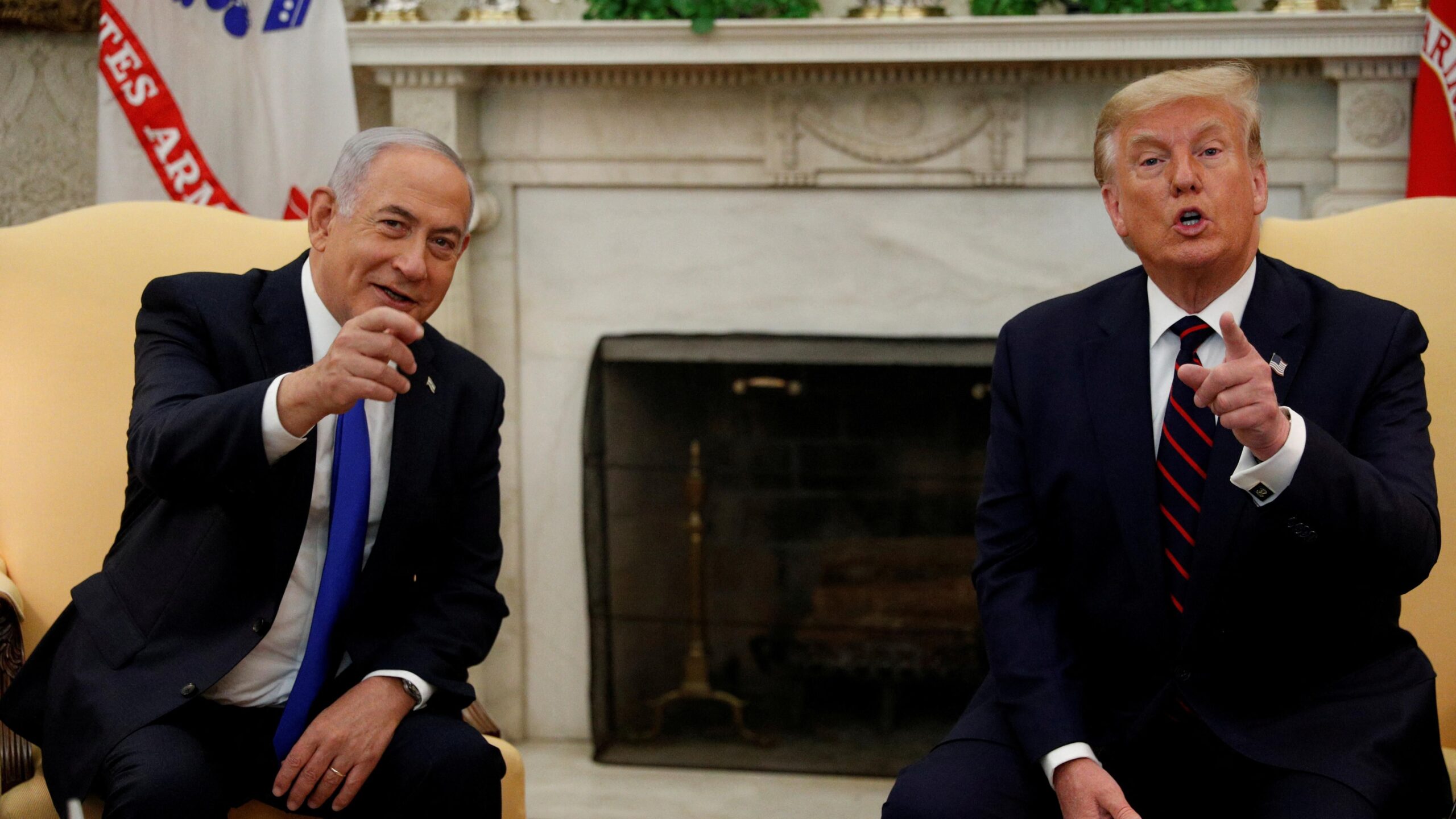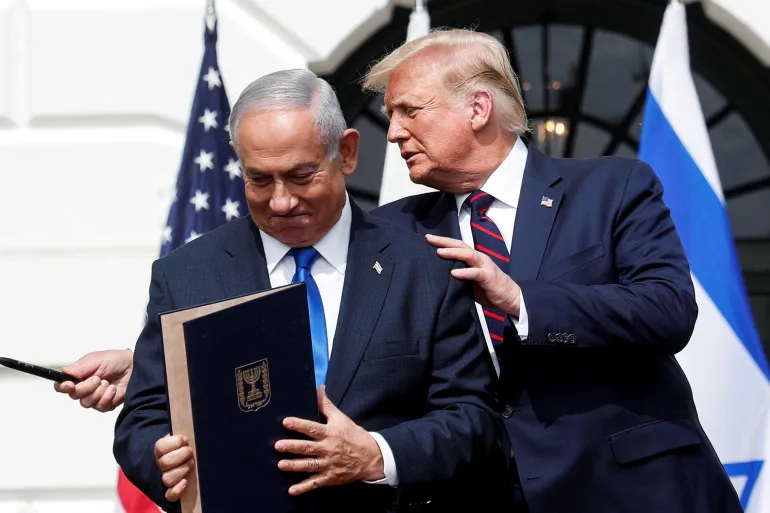“It wasn’t just another political meeting—it was a reunion of two longtime allies with a shared history and a keen eye on the future.”
When former U.S. President Donald Trump and Israeli Prime Minister Benjamin Netanyahu meet, it’s never just a casual conversation—it’s a political event watched around the world. Their recent gathering in Washington brought back the familiar image of two leaders whose alliance has shaped conversations on Middle East policy, U.S.–Israel relations, and global diplomacy. While the handshake and smiles may look routine, the timing of this meeting raises bigger questions: What message are they trying to send, and what might it mean for both domestic politics and international affairs?

The Meeting in Washington
When Donald Trump and Benjamin Netanyahu sat down together in Washington, it felt less like a formal diplomatic exchange and more like a reunion between two political heavyweights who have long understood each other. Cameras caught the familiar smiles, firm handshake, and the kind of body language that signaled comfort rather than formality.
While official details about the agenda were kept somewhat limited, the symbolism spoke volumes. For Trump, the meeting was another chance to remind audiences—both at home and abroad—that his influence on global politics hasn’t faded. For Netanyahu, facing political challenges back in Israel, the optics of sitting beside a close ally like Trump sent a reassuring message to his supporters.
What made the Washington meeting stand out wasn’t just what was said at the table, but the timing. Coming at a period of heightened tensions in the Middle East and shifting political currents in the U.S., the conversation carried weight far beyond the room.
Trump and Netanyahu’s Longstanding Relationship
The bond between Donald Trump and Benjamin Netanyahu didn’t just appear overnight—it has been built over years of shared political interests and public displays of support. During Trump’s presidency, the two often appeared side by side, praising each other in ways that went beyond the usual diplomatic niceties. From the U.S. decision to move its embassy to Jerusalem, to Trump’s strong backing of Israeli policies, Netanyahu found in Trump a leader willing to champion his vision on the world stage.
Their relationship has always carried a mix of personal warmth and strategic calculation. For Trump, standing with Netanyahu reinforced his image as a dealmaker and strong supporter of Israel, a position that resonated with many of his core supporters. For Netanyahu, Trump’s presidency was a period of political comfort, where U.S.–Israel ties reached a level of closeness that few other leaders could replicate.
Even now, outside the White House and amid Netanyahu’s ongoing political battles, their connection endures. It’s a reminder that in politics, alliances can outlast offices, carrying both leaders through shifting tides and uncertain futures.
Political Context & Timing
The timing of Trump and Netanyahu’s Washington meeting is far from accidental. Both leaders are navigating turbulent political waters, and a high-profile reunion gives each of them something valuable.
For Trump, it’s an opportunity to remind the public—and his rivals—that he still holds sway on the global stage. As conversations about U.S. leadership and the next election heat up, appearing alongside Netanyahu allows him to project the image of a statesman, not just a candidate.
For Netanyahu, the timing may be even more crucial. With political challenges and mounting pressure back home, meeting Trump offers a way to signal strength and stability to his supporters. Standing shoulder to shoulder with a former U.S. president underscores his ability to maintain powerful alliances, even when his domestic situation feels shaky.
Together, their meeting isn’t just about catching up—it’s about carefully chosen optics. In politics, timing can be as important as policy, and this Washington gathering was a reminder that both men know how to use the spotlight to their advantage.
Global and Regional Implications
The Trump–Netanyahu meeting wasn’t just about the two leaders—it rippled far beyond Washington. Anytime these two sit down together, policymakers, allies, and critics across the world start paying close attention.
For the Middle East, their reunion raised questions about what it could mean for ongoing tensions in the region. From Iran’s nuclear ambitions to the fragile balance of peace talks, both leaders have long been vocal about taking a hardline stance. A renewed sense of partnership might signal that similar policies—or at least similar rhetoric—could make a comeback on the global stage.

Beyond the region, the meeting also carried weight in terms of U.S. credibility abroad. For some allies, Trump’s visible connection with Netanyahu reinforced the idea that his influence hasn’t disappeared, even outside the Oval Office. For others, it was a reminder of the divisive policies that shaped U.S.–Israel relations during his presidency.In simple terms, this wasn’t just a photo-op. The optics and timing suggested that their conversation could influence not only domestic politics but also how the world prepares for shifting alliances and strategies in an already uncertain global climate.
Reactions & Analysis
As expected, the Trump–Netanyahu meeting stirred a wave of reactions. Supporters of both leaders saw it as a powerful reminder of their shared vision and strong alliance, with some praising the reunion as a sign of steady leadership in unpredictable times. For Trump’s base, the meeting reinforced his role as a global player, while Netanyahu’s supporters welcomed the optics of standing beside a close friend of Israel.
But not everyone viewed the gathering in such a positive light. Critics questioned the motives behind the timing, suggesting that both leaders were using the spotlight to shore up political support rather than focus on real solutions. Analysts also noted that the meeting could deepen divides—both domestically and internationally—given the polarizing legacies of the two men.
Political commentators were quick to highlight the symbolism: two embattled leaders, facing their own sets of challenges, leaning on each other for a show of strength. Whether seen as a strategic partnership or a calculated performance, the Washington encounter reminded the world that Trump and Netanyahu’s connection still has the power to shape conversations well beyond their own countries.